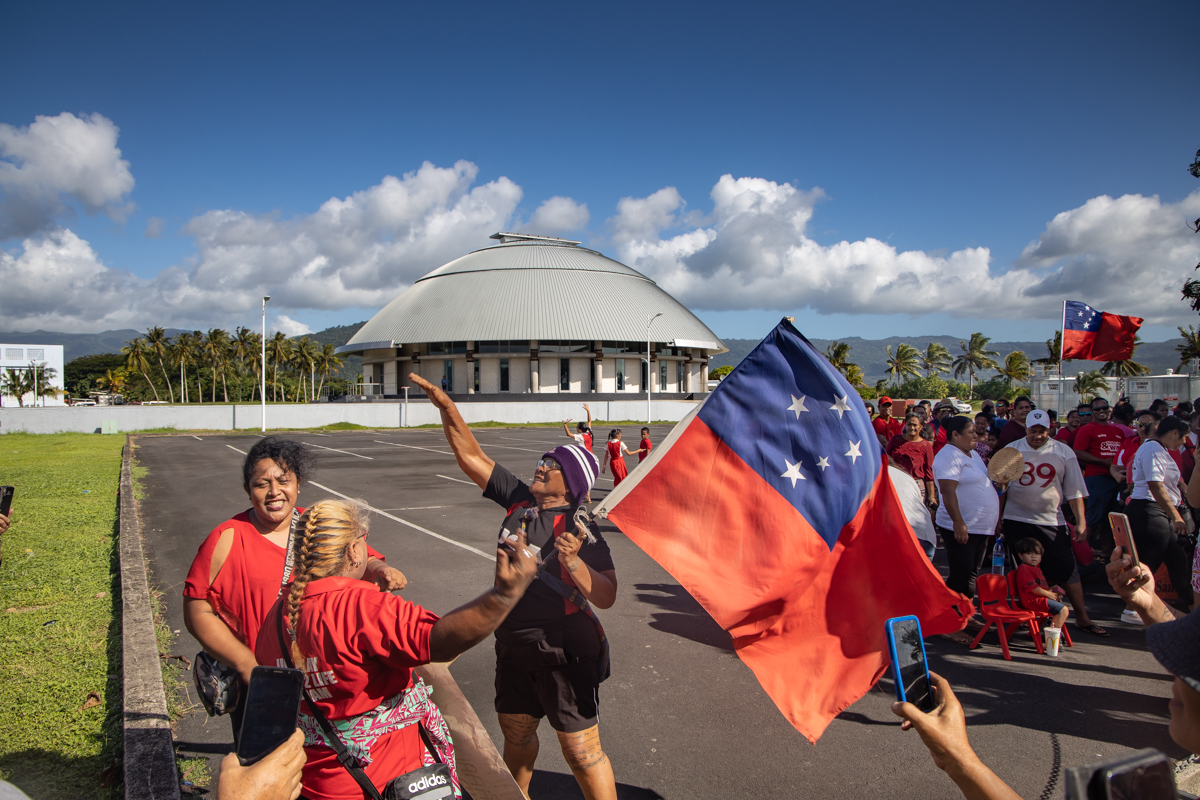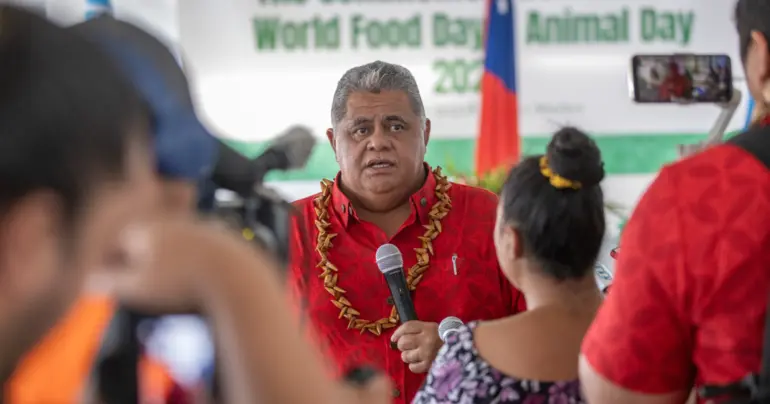Of Supreme Court rulings and uncertain futures
 By The Editorial Board
•
19 May 2021, 4:00AM
By The Editorial Board
•
19 May 2021, 4:00AM
Two monumental cases were before the Supreme Court on Monday; both were expected to deliver Samoa out of the general election groundhog day we are reliving over and over again.
We have heard the court’s ruling and while one party is celebrating and making plans to lead, the other party is putting their faith in the judiciary once again with an appeal and focus on election petitions.
When those cases will go before the court and how long it will take to settle them is not known, but by our estimates, it could be a wait to the end of the year.
Now, the elephant in the room is whether Parliament will be called by Monday 24 May (the last day in the 45 day timeframe given in the Constitution for Parliament to be called after a General Election) and who will call it.
Despite the court cases wrapping up, there has been no clear signal from the Legislative Assembly, or the caretaker Government, or the Head of State that the 17th Parliament will be called to session.
The caretaker Prime Minister hinted at the fact that Parliament could not sit until after legal challenges had seen their day in court.
But, does he make that call? Especially as there is murkiness around which of the two parties – Faatuatua i le Atua Samoa ua Tasi or Human Rights Protection Party – holds the sanctioned majority.
The country needs to know whether the Prime Minister’s claims are correct that F.A.S.T. has 24 seats instead of the 26 they are claiming.
F.A.S.T. party leader Fiame Naomi Mataafa has made her position very clear, their party has 26 seats (24 + Fiame + Tuala Iosefo Ponifasio) and she is ready to lead.
Once again it seems as though this will come down to whose interpretation of the laws/regulations is correct. It truly is a year for the legal profession.
We can take some satisfaction in the fact that the Supreme Court has provided the country with answers to previous questions over the constitutionality of the Head of State voiding the April 9 Elections, and the election of the 6th Woman Member of Parliament.
Keeping us enthralled for the last two weeks, the debates over percentages and H.O.S. powers have kept the nation circumspect over basic math and electioneering; arguing with each other, and with strangers, over who was right.
So the Supreme Court rulings were a welcome climax.
Their rulings have answered a lot of questions, and established a precedence [for now]; but how those rulings are used by politicians, is something we are yet to see.
That F.A.S.T. won both their court challenges against Government, comes as no surprise to their supporters and party faithful.
That the rulings would provide further insight in to the three powers of our democracy, is a blessed bonus. (The rulings were printed in full in our Tuesday edition).
In terms of the appointment of a 6th woman Member of Parliament, the Supreme Court found no basis in law for the Office of the Electoral Commission to add on the additional member.
While Justices Niava Mata Tuatagaloa, Vui Clarence Nelson and Lesatele Rapi Vaai made a unanimous call that the activation of Article 44(1a) on 20th April was unconstitutional, thereby voiding the Warrant of Election for Aliimalemanu Alofa Tuuau issued by the Head of State; it bears pointing out that they have confirmed that the Electoral Commissioner is able to activate the Article, but the timing of the activation is at the crux of the matter.
“Article 44(1a) should be activated after the final count of the ballot papers and before reporting to the Head of State,” states the court judgment.
So, yes, the Electoral Commissioner has the power to activate an additional woman member, but it must be right after the final count and before the H.O.S. provides his Election Writ.
In fact, Justices Tuatagaloa and Vaai agreed with the O.E.C. and Aliimalemanu that Article 44(1a) should be activated after the final count and before reporting to the H.O.S., and rejected the challenge by F.A.S.T. and Seuula Ioane that the Article should be activated after the election petitions and the resolution of any by-elections, if any.
Justice Vui Clarence Nelson provided a separate ruling, concluding that he agreed with the methodology used by the O.E.C. to calculate the minimum number of woman M.Ps.
“The Applicants view is contrary to the express purpose of Article 44(1a) [namely] to encourage and promote female presentation in Parliament by fixing an appropriate minimum and to provide, in the words of the Honourable Prime Minister, for an “automatic increase” in that number as the overall number of Members of Parliament increases.”
In reference to the timing of the Electoral Commissioner’s decision to activate the Article, Vui said there was a “need to have decisions of this nature by a statutorily constituted office made on a proper and clearly defined statutory basis free from the furnace of partisan politics and the taint of political bias”.
Absolutely.
The 2021 Elections have made it clear that our Electoral processes do not benefit from any Executive government involvement.
The second ruling on the H.O.S. decision to void the 9 April election and call a fresh election was also delivered on Monday.
The Chief Justice Satiu Simativa Perese with Vui Clarence Nelson and Tafaoimalo Leilani Tuala-Warren concluded that the Head of State does not have the power to call for a fresh election. That means the result of the April General Election and the relevant writs associated to the results continue to be valid and lawful.
The judges then directed the H.O.S’ attention to his Constitutional obligation to calling a meeting of the Legislative Assembly within 45 days.
They have also called for the office of the H.O.S. “to have access to publicly funded but independent staff and resources, including legal advisors”. This has merit.
This definitely brings home their opening message that their judgment is concerned with the correctness of the advice upon with the H.O.S. relied, which they say was inadequate.
The Head of State, while considered to be a mere figurehead, has enough authority to make major calls – as we have seen in recent weeks – and being able to operate with some autonomy would likely provide an added safety net in the protection of our democratic processes.
But most especially for the Head of State, whose position should be met with reverence and respect.
There should not be any doubt from the public or politicians, over the loyalty of the titular head of Samoa. And that can only be achieved with a proper level of independence.
The Supreme Court held that the Electoral Law of Samoa (comprised of the Constitution, Electoral Act 2019 and Regulations and the relevant decisions of the Court) has established sophisticated systems and procedures to govern the various parts of the electoral process.
This could provide comfort to many who may have gone to the dark side, questioning the validity of our democracy with the numerous bombshell decisions that were testing the power of our supreme legal document.
A comparison of Samoa’s co-existing governance structures became the example used by the Supreme Court to explain why they disagreed with the submission by the Attorney-General’s Office and the O.E.C. that a fresh election was called because of the intractability of the two parties and urgency of government administrative needs.
“The calling of a meeting of the Legislative Assembly will enable the cultural process of soalaupule to take place.
“We do not interpret the Constitution to undermine or discourage observance of cultural traditions. Chiefs of a village do not resolve the problems arising among the people of the village by sending emails or social media posts to each other, either directly or through surrogates.
“On the contrary, since the adoption of the Constitution, it has been tradition to sit together and discuss matters to find solutions. If not solutions can be found, then those meetings are adjourned to allow for discussions to continue. That is in the nature of oral tradition.”
The two rulings are worthwhile reading for those who want to understand why the separation of powers is so important. The Justices touch on topics that many of us have been debating within our own circles. Having a third party make the call and settle the score brings a certain amount of peace and calm.
As one of the pillars of our democracy, the Judiciary has proven itself to be the wise counsel this country has needed for the last few months.
But the question on everyone’s lips right now is what will the caretaker Government do next?
 By The Editorial Board
•
19 May 2021, 4:00AM
By The Editorial Board
•
19 May 2021, 4:00AM











